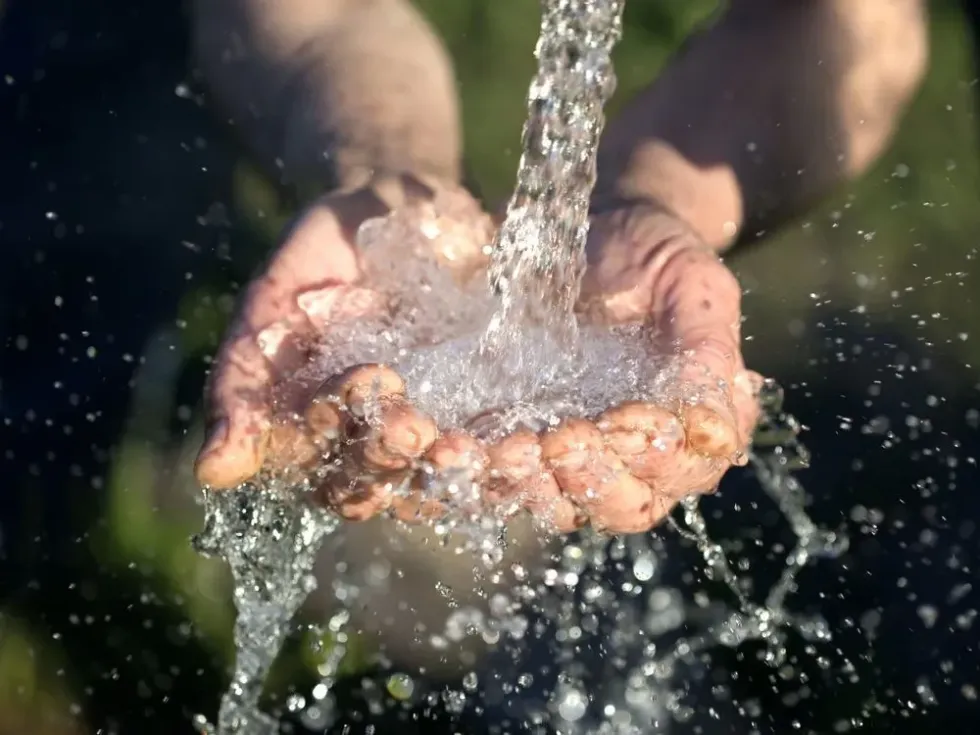Both groundwater and well water are used as drinking water by many people.
Water that is generally trapped in the pores and crevices of the dense rock barrier below the ground is called ground water. This is the same water we get when we dig up wells!
Regardless of containing so much water ourselves, only 1% of the Earth's total water supply is potable. In most countries, drinking water and water supply from wells are largely utilized in rural areas than in urban areas.
Groundwater is available in the threshold beneath the surface of the ground.
A well is a structure that is built to gain access to this water and pipe structures are created where this water can reach homes for a variety of uses. A hole is made in the ground and a pump is attached to the hole to get fresh water into homes for consumption purposes.
These wells are completely cased over but a major drawback with wells is that it gets contaminated and the water quality can reduce greatly.
This can make it difficult to draw water from the ground surface. Deep wells have a lower risk of the water getting contaminated but with shallow wells, there are more chances of contamination in the surface water as it can be affected by toxins and harmful bacteria.
Two types of well pumps exist which are submersible pumps and jet pumps. Jet pumps are mainly used in shallow wells and submersible pumps are fixed in deep wells and connected to a power source above the ground.
Groundwater is often referred to as 'aquifer' or 'groundwater aquifer'. Drinking water that is obtained from shallow wells must be tested frequently so that you can make sure that it is free from contamination and if water treatment is needed.
Importantly, private well water must be checked and treated at least once a year as private well owners are responsible for the safety of the water they use. Among private wells, there are three types - dug wells or bored wells, drilled wells, and driven wells.
Dug wells are made traditionally where holes in the ground are dug with a backhoe or a shovel. To prevent their collapse, they are lined or cased with tiles, bricks, and stones.
However, they are not cased as frequently. Drilled wells are constructed by drilling machines or by percussion.
They are very deep wells and proper casing must be done to ensure the safety and hygiene of the water. These wells also draw water from the aquifers on the surface.
Nonetheless, there are fewer chances of the water being contaminated in these wells. With driven wells, the water can have contaminants as it is drawn from the aquifers present on the surface.
They are built by driving a pipe into the ground and are quite shallow. As a result, they need to be cased frequently.
Owners of water wells also employ the use of well screens to prevent clumps of sediment from entering the wells. Some of the common well screens that are used are continuous slots, slotted pipes, and perforated pipes.
The location of a well and the way it is constructed or built-in largely determines the safety of the water. Often, rainwater becomes a water problem!
Rainwater can pick some toxic chemicals from the surface of the land. Groundwater pollution can also take place because of leaks from landfills, septic tanks that haven't been constructed properly, fertilizers and pesticides, drainage leaks, and underground fuel leaks. Consumption of polluted water can lead to some serious health problems.
Apart from this, water wells can be a good alternative compared to municipal water and can also allow you to save up a lot of money. It can provide you with an endless water supply, causing almost no hassle!
With sufficient water filtration, water from wells can be great for your health and to use for other daily purposes.
A reverse osmosis water filtration can be great in eradicating some potential water pollutants and bacteria. It is most often used with the tap water in the kitchen, removing traces of contaminants like elements of heavy metals, coliform bacteria, sulfate, and hardness too, producing great tasting water.
With well water, certain specific tests can be used if particular contaminants are found in the water.
Normally, sources of groundwater are tested for uranium, arsenic, nitrates, and selenium. Through water testing, the water quality can change and in accordance, influence its taste too!
Well Water Origin
From historical research and evidence, it has been found that water wells have existed for about 8000 years! The first water well is believed to have been constructed in India, Israel, and China. In India, wells are quite common.
Many Indians are known to have their own private wells, in turn having their own water supply. They build wells by digging holes by hand and then lining them with bricks and stones.
In China, workers during the Neolithic era dug wells by hand to gain access to the groundwater for drinking purposes. These wells are quite basic with logs placed at the bottom to increase the water level with the top part consisting of a square casing.
The world's deepest well that has been hand-dug is found in Brighton, East Sussex in Britain and has a name too! It is called the Woodingdean Water Well.
For four years, workers worked 24 hours seven days a week to get this well built and to hit some groundwater. The well is open to visitors all year round as well.
Difference Between Well Water And Tap Water
Both groundwater and tap water is usually quite safe for drinking as it passes through many water filtration systems. Again, some people prefer groundwater over surface water for a large range of reasons.
For instance, during droughts, groundwater is a much more reliable source than water that is found at the surface. Groundwater is also a cheaper alternative and can save up a lot of your money when it comes to water treatment.
Water treatment can be expensive and can be even more so when treating tap water. Groundwater can be tapped into through wells but surface water can only be obtained from rivers and lakes.
Tap water is the water that comes from the water supply system of a city or town. Towns and cities often have certain rules and regulations which do not exactly allow residents to build or construct their own private wells. Through the municipal system, the water is safe, filtered, and perfectly clean for drinking.
Types Of Well Water
With many developments in modern society, people are building a wide variety of wells. Typically, there are three types of wells which dug or bored wells, driven wells, and drilled wells.
Dug or bored wells are usually done by hand and are not very deep. As a result, these wells pose the biggest problem for polluted water.
During extremely hot weather where the possibility of droughts is high, these wells can be a disadvantage as the water can dry up very quickly. Driven wells are wells that are built using pipes.
People construct these wells only in locations that have loose soil and no gravel or stone. The pipes are driven deep into the ground and high water pressure is used.
Drilled wells, lastly, as their name goes, are wells that are used using a drilling machine or some sort of percussion-inducing instrument. These wells are good at being able to draw water from the aquifers at the ground surface.
If you are a private well owner, ensure that you test your water frequently to maintain its health and keep it free from contamination as it can include substances like arsenic, lead, uranium, and nitrates. These can pollute the water. Testing your water can also influence its odor and taste.
Uses Of Well Water
Well water is one of the cost-effective ways to get your water supply.
Unfortunately, since a substantial amount of us live in highly urbanized towns and cities, the municipal system would not allow us to build a private well for ourselves due to certain rules that they've laid out. Therefore, we have access to tap water which comes from a main water supply system in the city or town.
The overall health of the water is safe as it is devoid of any sedimented material and toxic substances as it passes through a number of filtration systems.
Well water can be used for drinking, irrigation, and other such uses around your home. Wells are also known to have a long life so they can be used for many years.








